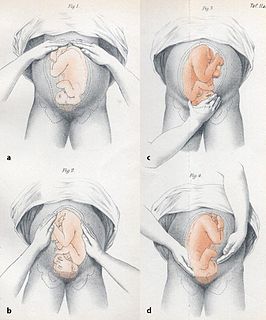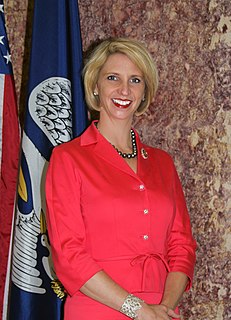Related Research Articles
Abortion is the termination of a pregnancy by removal or expulsion of an embryo or fetus. An abortion that occurs without intervention is known as a miscarriage or "spontaneous abortion"; these occur in approximately 30% to 40% of pregnancies. When deliberate steps are taken to end a pregnancy, it is called an induced abortion, or less frequently "induced miscarriage". The unmodified word abortion generally refers to an induced abortion. The reasons why women have abortions are diverse and vary across the world. Reasons include maternal health, an inability to afford a child, domestic violence, lack of support, feeling they are too young, wishing to complete education or advance a career, and not being able or willing to raise a child conceived as a result of rape or incest.

Obstetrics and Gynaecology is the medical specialty that encompasses the two subspecialties of obstetrics and gynecology.

A doula is a trained companion who is not a healthcare professional and who supports another person through a significant health-related experience, such as childbirth, miscarriage, induced abortion or stillbirth, or non-reproductive experiences such as dying. A doula may also provide support to the client's partner, family, and friends.

Maternal death or maternal mortality is defined in slightly different ways by several different health organizations. The World Health Organization (WHO) defines maternal death as the death of a pregnant woman due to complications related to pregnancy, underlying conditions worsened by the pregnancy or management of these conditions. This can occur either while she is pregnant or within six weeks of resolution of the pregnancy. The CDC definition of pregnancy-related deaths extends the period of consideration to include one year from the resolution of the pregnancy. Pregnancy associated death, as defined by the American College of Obstetricians and Gynecologists (ACOG), are all deaths occurring within one year of a pregnancy resolution. Identification of pregnancy associated deaths is important for deciding whether or not the pregnancy was a direct or indirect contributing cause of the death.
Late termination of pregnancy, also referred to as late-term abortion, describes the termination of pregnancy by induced abortion during a late stage of gestation. In this context, late is not precisely defined, and different medical publications use varying gestational age thresholds. In 2015, about 1.3% of abortions in the United States took place after the 21st week, and less than 1% occur after 24 weeks.
Dilation and evacuation (D&E) is the dilation of the cervix and surgical evacuation of the uterus after the first trimester of pregnancy. It is a method of abortion as well as a common procedure used after miscarriage to remove all pregnancy tissue.

An unsafe abortion is the termination of a pregnancy by people lacking the necessary skills, or in an environment lacking minimal medical standards, or both. An unsafe abortion is a life-threatening procedure. It includes self-induced abortions, abortions in unhygienic conditions, and abortions performed by a medical practitioner who does not provide appropriate post-abortion attention. About 25 million unsafe abortions occur a year, of which most occur in the developing world.
Warren Martin Hern, M.D., M.P.H., Ph.D. is an American physician best known for performing late terminations of pregnancy. In 1973, he founded Boulder Abortion Clinic in Boulder, Colorado. Hern was a founding member of the National Abortion Federation, and authored Abortion Practice, a comprehensive text on operating and evaluating abortion facilities. He and doctors LeRoy Carhart, Shelley Sella, and Susan Robinson were the subject of the 2013 documentary After Tiller about the four providers openly advertising later abortions in the United States after the 2009 assassination of George Tiller.

Jane Elizabeth Hodgson was an American obstetrician and gynecologist. Hodgson received a bachelor's degree from Carleton College and her M.D. from the University of Minnesota. She trained at the Jersey City Medical Center and at the Mayo Clinic.
Unintended pregnancies are pregnancies that are mistimed, unplanned or unwanted at the time of conception.
The following outline is provided as an overview of and topical guide to obstetrics:
David A. Savitz is a professor of Community Health in the Epidemiology Section of the Program in Public Health, Vice President for Research, and Professor of Obstetrics and Gynecology, at The Alpert Medical School of Brown University, and Associate Director for Perinatal Research in The Department of Obstetrics and Gynecology at Women & Infants Hospital, both in Providence, Rhode Island. Savitz is the author of Interpreting epidemiologic evidence: strategies for study design and analysis (ISBN 0-19-510840-X) and more than 275 peer-reviewed articles. He was elected to the Institute of Medicine in 2007.

Ipas is an international, non-governmental organization that seeks to increase access to safe abortions and contraception. To this end the organization informs women how to obtain safe and legal abortions and trains relevant partners in Africa, Asia, and Latin America on how to provide and advocate for these.
Scott B. Ransom is a Partner in the Health & Life Sciences Advisory at Oliver Wyman.
A medical abortion, also known as medication abortion, occurs when drugs (medication) are used to bring about an abortion. Medical abortions are an alternative to surgical abortions such as vacuum aspiration or dilation and curettage. Medical abortions are more common than surgical abortions in most places, including Europe, India, China, and the United States.
Friday OkonofuaFAS is a Nigerian professor of Gynecology and Obstetrics. He is the pioneer Vice Chancellor of Ondo State University of Medical Sciences and founder of Women Health and Action Research Centre, a not-for-profit organization headquartered in Benin City, that focuses on promoting female reproductive research.
Paul D. Blumenthal is an American physician, researcher, cervical cancer prevention advocate, and abortion provider who is certified in obstetrics and gynecology. He is known for his cervical cancer, abortion, and contraception research. He is also known for his commitment to international women’s health—evidenced by his contribution to public health initiatives in over 30 countries.
John Mercer Thorp, Jr. is an American obstetrician-gynecologist a Faculty Fellow at the Carolina Population Center, and the Hugh McAllister Distinguished Professor in the Department of Obstetrics and Gynecology at the University of North Carolina at Chapel Hill (UNC), where he directs the Division of General Obstetrics and Gynecology and serves as Vice Chair of Research.

Rebekah Elizabeth Gee is an American physician and public health policy expert who served as the secretary of the Louisiana Department of Health from 2016 to 2020. Prior to her role as secretary, Gee was the Medicaid medical director; she previously served as the director for the Louisiana Birth Outcomes Initiative. Following her resignation, Louisiana State University announced that Gee had been appointed CEO of LSU Health New Orleans' Health Care Services Division.
The Society of Family Planning (SFP) is an international non-profit professional organization established in 2005 specializing in "abortion and contraception science" composed of physicians, nurses, sociologists, public health practitioners and trainees in these fields. The majority of member physicians include specialists of obstetrics and gynecology, family medicine, and adolescent medicine.
References
- ↑ "Grimes, David A." Library of Congress. Retrieved 29 January 2016.
- 1 2 3 4 "David Grimes Website" . Retrieved 29 January 2016.
- ↑ Ronan, Alex (13 October 2015). "The First Legal Abortion Providers Tell Their Stories". New York Magazine. Retrieved 29 January 2016.
- ↑ Dennis, Brady (20 April 2013). "Problems at Pa. abortion clinic point to lack of facilities oversight". Washington Post. Retrieved 29 January 2016.
- ↑ "FHI VP receives preventive medicine award". FHI 360. 2006-05-10. Retrieved 2020-06-01.
- ↑ "FHI's David Grimes inducted into the Institute of Medicine". Family Health International. 2007-10-08. Retrieved 2020-06-01.
- ↑ Abcarian, Robin (9 March 2015). "No regrets: Reclaiming abortion as a force for social good". Los Angeles Times. Retrieved 29 January 2016.
- 1 2 Raymond, Elizabeth G.; Grimes, David A. (February 2012). "The Comparative Safety of Legal Induced Abortion and Childbirth in the United States". Obstetrics & Gynecology. 119 (2, Part 1): 215–219. doi:10.1097/AOG.0b013e31823fe923. PMID 22270271. S2CID 25534071.
- Serena Gordon (23 January 2012). "Abortion Safer for Women Than Childbirth, Study Claims". U.S. News & World Report.
- ↑ Bazelon, Emily (18 July 2010). "The New Abortion Providers". New York Times. Retrieved 29 January 2016.